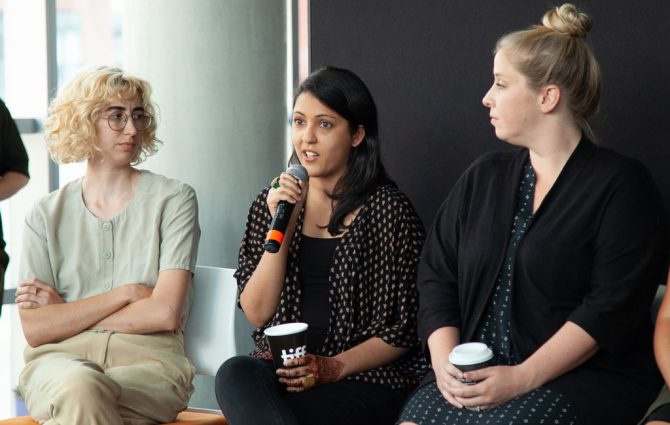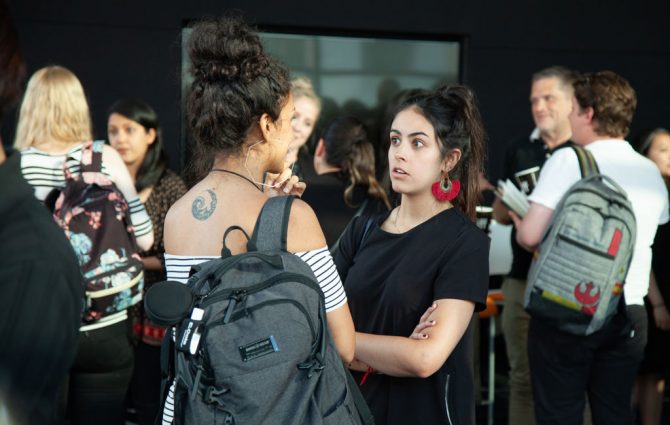Top 10 Things All Emerging Filmmakers Should Know About Navigating Toronto’s Film Festival Circuit
On Wednesday, July 24, I was invited to attend the TIFF Higher Learning: Navigating the Festival Circuit panel discussion.
During the two-hour event, which was held at the TIFF Bell Lightbox, a panel of representatives from some of Toronto’s top film festivals took to the stage to reflect on their experiences as programmers, with a particular focus on the contemporary short-film landscape and selection process.

The panel included: Madelaine Russo, Industry Programmer for Hot Docs Canadian International Documentary Festival; Miriam Zaidi, Executive Director of Breakthroughs Film Fest; Judith Schuyler Programming Coordinator for imagineNATIVE Film and Media Arts Festival; Kristine Estorninos, Head of Programming for Reel Asian, Scott Ferguson Inside Out Programmer and former Executive Director, and rounding out the panel was Laura Good, Manager of Film Circuit at TIFF.

Here, I have compiled the Top 10 things all emerging filmmakers should know when submitting to film festivals:
1. Be Authentic
Your uniqueness comes from your voice, not your theme. Make sure you are telling a story in your voice, it doesn’t matter if the idea is new or a love story told a thousand times before, if you have a unique directorial voice, your movie will stand out.
2. Do your research
Find festivals that suit the story If you are a student filmmaker, find student festivals. There are so many film festivals all over the world; you need to research which festivals are the best fit for your project. Find a similar film to yours and research the path that the film took and the festivals it got into.

3. Focus on technical aspects
You don’t need to have the latest gear or use a Red Epic to get into film festivals. What you do need is to understand what your gear can do, how to light the scene and make sure you have good audio! Nothing ruins a movie faster than bad audio.
4. Submit early
The earlier you can submit to a festival the better! Festivals start to make their decisions before the final deadline, deciding the themes of that year’s festivals and putting together programs for specific run times. If you get your film in early, you have a higher chance of fitting into a program, however, don’t rush your film! If your film isn’t finished for the deadline you can always submit to the following year’s festival.
5. Ask to have the submission fee waived
It never hurts to ask to have the submission fee waived. This gets you on the selection committee’s radar and the worst thing that can happen is the festival will say no.

6. Show your film to an impartial audience
As filmmakers, it’s easy to see our work as masterpieces, this is why it’s crucial that you show an impartial party your work. Show it to someone who can give you constructive feedback: Does your story need to be 45 minutes or can it be cut down to 10? Does the single shaky shot tell us the mental state of your character or should you reshoot with a stabilizer? These are all things an impartial audience can help you with.
7. Don’t overlook smaller community festivals
In an ideal world, your movie will premiere at TIFF, however, if this doesn’t happen you should look to other festivals. Community festivals are a great way to get your film seen and get your name out there as a filmmaker to watch.
8. If submitting through a website like FilmFreeway make sure to fill in all the fields
This includes making a teaser trailer and writing a cover letter about why you were the best person to tell your story. These are all things that will help your film stand out from the thousands of other films being submitted.

9. Learn from your mistakes
Not everything is going to go to plan when making your movie and that’s okay, but you need to learn what went wrong and how you can fix it for the next movie.
10. Don’t get discouraged
The film festival world is challenging, there are often times when your film won’t be selected – not because the film isn’t a brilliant piece of cinema, but purely because it doesn’t fit the theme of the programming for that year. Keep making your art, because no one else can tell your stories.
If you want to learn more about TIFF Higher Learning or want to attend an event, you can sign up for their newsletter at https://tiff.net/higherlearning


